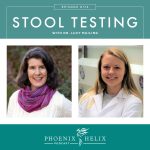“Of several remedies, the physician should choose the least sensational.”
~ Hippocrates
Not Every Practitioner Is Helpful
When it comes to reducing autoimmune symptoms, diet and lifestyle are the foundation, but when you hit a plateau it makes sense to seek help. The problem is that not all practitioners are created equal. So how do you find a good one? When you’re about to make a large investment of your money and time in trying to heal, you want to find a guide who can truly help. In this article, I share my best advice for finding the right person to add to your healthcare team. Disclaimer: I am not a healthcare practitioner myself. I’m just a woman with autoimmune disease on a healing journey similar to your own. My advice comes from my personal experience, interviews with excellent practitioners, and also speaking with hundreds of people with autoimmune disease and seeing what has and hasn’t worked for the community at large.
Signs of a Good Practitioner
- They recommend the paleo diet and lifestyle as the foundation. A good practitioner will be well-versed in paleo principles and have you try this for at least 1-3 months before trying anything else. It clears a lot of symptoms on its own and clarifies where troubleshooting needs to begin. Notice I said diet and lifestyle – they should advise you on areas beyond food as well, such as sleep and stress management. Both are common obstacles to healing. Here’s a list of Paleo Functional Medicine Practitioner Directories.
- They specialize in autoimmune disease. One of the mistakes I’ve seen not-so-great practitioners make is treating everyone the same. People with autoimmune disease have different body responses than people without autoimmune disease, and the recommendations need to be personalized to our needs.
- They don’t promise cure or remission. If a practitioner tells you they will cure your autoimmune disease, leave and don’t come back. They’re either outright lying to you or have a complete misunderstanding of how autoimmune disease works. Similarly, if a practitioner promises remission, they aren’t being authentic either. Although it’s our greatest hope, it’s not something that can be promised. There is no practitioner who has achieved remission with 100% of their patients. It’s a possibility – yes – and certainly worth trying for, but an honest practitioner doesn’t prey on our vulnerability by pretending they can guarantee it. What a practitioner should be able to promise is that they will use their skills and knowledge to help you reverse your autoimmune symptoms and reclaim your quality of life. The goal is to help us live the best life possible with autoimmune disease, and that is a very worthwhile goal.
- They listen and see you as a partner in healing. They take a detailed patient history and want to know what you have and haven’t tried, which interventions have succeeded and which have failed, and what your intuition is telling you about your health. You are seeking them out for their expertise, but the respect should go both ways.
- They help you prioritize. There are lots of potential areas of troubleshooting when it comes to autoimmune symptoms: gut health, adrenal health, hormone imbalances, nutritional deficiencies, genetic challenges, detoxification support, etc. A good practitioner will be able to tell where to start, by listening closely to your symptoms and patient history. Their approach should be targeted, rather than a shotgun “test everything” method. Often, when the most important problems are addressed, the others naturally resolve along with them.
- They make judicious recommendations when it comes to supplements. People with autoimmune disease usually have compromised digestion and detoxification abilities. Any pills – including natural ones – put a burden on our bodies. Sometimes the benefit makes it worthwhile, but the goal is to take the least amount of supplements for the shortest amount of time. A good practitioner will prioritize here as well. They will explain why they’re needed, and they will re-evaluate regularly whether or not they are still needed. The supplements should also be allergen-free. Be sure to read the labels yourself – a lot of poor practitioners don’t seem to know what’s in their supplement lines. Resource: Where Supplements Fit on a Healing Diet.
- If you respond negatively to a treatment protocol, they change their recommendations accordingly. The goal is for you to get better, not worse. And while some treatments such as parasite cleanses can make you feel worse for a few days, that should be temporary, and ideally avoided altogether. The term “healing crisis” is overused in the functional medicine community. A good practitioner won’t tell you to power through. They will reassess the situation. Resource: Is a Healing Crisis Really Healing?
Red Flags – Practitioners to Avoid
- They are either anti-paleo or don’t have a true grasp of the protocol.
- They tell you that tests and supplements trump diet and lifestyle changes.
- They want you to spend thousands of dollars at your very first appointment.
- They prescribe a grocery sack full of supplements, and those supplements contain allergens and/or ingredients not allowed on the paleo autoimmune protocol.
- They prioritize the tests in the “waste of money” list below, rather than the tests that give you the most value.
- They recommend “detox cleanses” – something that often hurts more than helps people with autoimmune disease.
- They tell you that if you feel worse, it’s a sign a treatment’s working.
- They make grandiose promises.
- They leave you feeling frightened instead of empowered.
- They don’t listen to you.
Tests That Give You the Most Value for Your Money
- Comprehensive Blood Test – The good news is that this test is often covered by insurance and you may already get this annually from your regular doctor. A functional medicine practitioner looks at this test through a different lens, gleaning a great deal of information about what’s happening in your body.
- Comprehensive Stool Test – This test screens for pathogens, yeast and parasites, but it also looks for beneficial bacteria, mucosal integrity and inflammatory markers as well. It provides a lot of information, and gut health is intimately linked with autoimmune health. This podcast compares quality among different labs: Ep. 172 Stool Testing.
- Urine Organic Acids Test – To educated eyes, this test provides a ton of information. You’ve heard of the MTHFR mutation? It’s a genetic mutation that many people with autoimmune disease have that can interfere with our bodies’ ability to detoxify. However, just because you have the mutation doesn’t mean you have a problem. This test shows your actual methylation function – it’s a much more helpful marker. And that’s not the only one. This test reveals details of cellular metabolism bodywide, providing information on gut health, nutrient absorption, detoxification capacity, neurotransmitter breakdown and more. The most respected labs are Genova and Great Plains.
- SIBO Breath Test – Small Intestine Bacterial Overgrowth is a common problem among people with autoimmune disease. Markers for this will show up in the stool and urine tests listed above. This test specifically clarifies what type of SIBO, to best determine treatment recommendations. The most respected lab is Genova.
- Hormone Testing – There are three areas where hormones can go out of balance: adrenals, thyroid and sex hormones, and since they all interact, often if one is out of balance, they all are. Hormone imbalances directly impact autoimmune flares, so this is an important area. For adrenal and sex hormones, saliva testing was the standard and is still used by many practitioners. However, there is a new urine test called the DUTCH test that many practitioners are switching to. For thyroid health, you want a complete thyroid blood test that measures TSH, free T3 & T4, reverse T3, and thyroid antibodies (TPO and TgAB).
- Ordering the Tests – Most people order the tests through their practitioner. You can also order them through Directlabs.com.
- Note: I’m not saying that everyone needs all of these tests and certainly not all at once. Your practitioner should help you prioritize based on your symptoms, but if they recommend 1-3 of these tests, you will get a lot of information for your investment.
Tests That Are Largely a Waste of Money
- Food Intolerance Testing – Notorious for both false positive and false negatives, the science behind these simply isn’t sound. An elimination diet like the paleo autoimmune protocol is the gold standard for determining food intolerances. If you don’t feel better on the AIP, troubleshoot through the recommended tests above instead. Don’t try to “diet harder”. Resource: Why Food Intolerance Testing Doesn’t Work.
- Heavy Metal Testing – These are also notorious for false results. In fact, one lab was sued for having a misleading lab range that marked everyone as high in heavy metals, whether they were or not. In addition, the treatment protocol for heavy metals is chelation, and that is contraindicated for people with autoimmune disease. Dr. Datis Kharrazian has seen many autoimmune patients worsen, or even have new diseases triggered, by going through chelation protocols. A nutrient dense paleo diet is naturally chelating at a pace our bodies can handle. We can support this process through gentle measures that make us feel better rather than worse, such as Epsom salt baths. Resource: What You Need to Know About Chelation. Update 2018: There is now a new type of testing that is well respected and offers milder treatment (non-chelation). To learn more, listen to Podcast Episode 101: Heavy Metals.
- Leaky Gut Testing – If you have autoimmune disease, you have leaky gut. They go hand-in-hand, and a test isn’t necessary. In addition, neither condition can be permanently cured, so again, a test isn’t helpful. Don’t be discouraged, though – both can be improved and managed through diet and lifestyle choices, along with the clearing of infections. Whatever you do to help heal your autoimmune symptoms will also help seal your leaky gut. Resource: Episode 32 of the Phoenix Helix podcast – Leaky Gut with Dr. Alessio Fasano.
- Chronic Lyme Disease Testing – I have a lot of friends who have been diagnosed with chronic lyme disease, and they might be surprised to see it on this list. Let me explain why. Early lyme disease can be successfully diagnosed and treated. This is when the condition is caught very shortly after a tick bite. However, tests for chronic lyme disease are prone to false positives, leading to misdiagnoses and overtreatment of a large portion of those tested. In addition, treatment is usually ineffective. In fact, many people feel worse instead of better after long-term antibiotic protocols, and I know a number of people who wish they hadn’t gone through treatment. Lastly, there is controversy over whether chronic lyme disease even exists. Let me be clear: the symptoms associated with chronic lyme are definitely real; the question is whether lyme disease is the cause or if the true cause is unknown. Either way, this isn’t a helpful diagnosis because it doesn’t usually lead to improved symptoms.
- You May Be Feeling Angry If You’ve Had These Tests – I understand that! It is frustrating. Sometimes we even get attached to test results that we’ve invested time and money in, even when they haven’t led to symptom improvement. My goal with this article is to help us all make the best choices we can going forward, and to highlight the tests and treatments that offer the greatest chance of symptom improvement.
Tests Not Mentioned
Above, I listed what I consider to be the best and the worst tests for your money. There are many tests I didn’t mention. It’s simply not possible to list every test that’s offered. Some fall into a middle category – neither the best nor the worst. They might be helpful further down the line as you refine your troubleshooting, or they might not be necessary at all. Always start with the “best bang for your buck” recommendations above.
Patience Vs. Progress
Even with an excellent functional medicine practitioner, trial and error is part of the healing process. But a good practitioner checks in with you, listens to how you’re responding and adjusts recommendations accordingly. And do remember this is a partnership. Be empowered in your relationship with any practitioner you choose: speak up, ask questions, express concerns, make requests. And be sure to listen to your practitioner as well. Once you’ve decided together on a course of action, commit to it. No one can “fix” you without your help.
Local Vs. Telehealth
It is better to work with a good practitioner via telehealth than a bad practitioner locally. Don’t limit yourself to your geography. Good paleo functional medicine specialists are rare, and they can work very effectively with you from a distance, using today’s technology.
You May Also Be Interested In











I live in Malaysia and am looking for a functional medicine doctor for my mum and family . 2 of my children are allopathic medicine doctors but I am slowly converting them as I hate the drugs they prescribe . Please help
Hi Tejin. If you can’t find one locally, many functional doctors in other parts of the world work with people via Skype. So, that’s an alternate option. I include links for functional practitioner directories in the article above, to help your search.
Thanks for pointing out that a good practitioner will be well-versed in paleo principles and start with that as the foundation of your treatment. I would imagine that a practitioner who cares about your whole lifestyle, like you mentioned, would probably care a lot about your recovery as well. I also appreciated your honesty about a good practitioner not promising cure or remission, since nothing is guaranteed, but doing their best to help you in any event.
Thanks, Luke! We are kindred spirits in the way we view health and help.
I’ve never thought that it could be better to work with a good practitioner over Skype than a bad one locally. It’s nice when you can meet in person. However, I go think you make a good point that it’s better if you’re getting better care.
Yes, good practitioners are a rare breed. I’m so grateful that Skype makes them available long-distance.
Eileen this is perfectly timed, thank you! Between this article and Mickey and Angie’s recent AI handbook podcast on finding a good practitioner ( and how to sack those that are not working!) I feel so much more in control.
I was getting very uncomfortable with the functional doc I’ve just found. Initially there was just a massive sense of relief that someone was finally looking after me and could work on my unusual health issues, but after doing some testing, it was the prescription of chelation that came in a simple word doc with a list of supplements that alarmed me. After some research I decided there was no way I was going down that road, especially as the testing was not done correctly! I felt so demoralised and felt like giving up. But now I know that there ARE good functional docs out there and I shouldn’t be afraid to try others, stating at the start what kind of relationship I am looking for, I feel empowered again. Thank you! Let the search continue….
Melly, thanks so much for sharing your story. It’s a perfect example of being an empowered patient: knowing what therapies you are and are not comfortable with, and knowing when it’s time to seek a different (and better) practitioner.
How can I find a functional dr who works through Skype? I am so frustrated.
Hi Lynne. Any practitioner who offers services through Skype will say so on their website. If you’re not sure where to begin looking, I recommend listening to some of my podcasts and see which guests resonate with you. A number of them are functional medicine practitioners who work with people via Skype. Here are a few: Anne Angelone (episode 9), Fiona McCulloch (episode 13), Christopher Kelly (episode 15), Melanie Keller (episode 29), Justin Marchegiani (episode 38), Michael Ruscio (episode 42), Evan Brand (episode 44), and future episodes will have more. You can find their contact information linked in the intro and outro of the show notes (linked for each episode above). Wishing you healing on every level.
Like Emma, I don’t regret getting tested for Lyme disease. It made sense to run the test, given both my symptoms and the fact that I had a tick bite shortly before those symptoms began. I think the key is really what your doctor does with that information and I am very grateful that my doctor has not pushed antibiotics and instead is guiding me on an herbal protocol, while also working on some nutritional deficiencies that might be the real cause of my current symptoms.
Amen to everything you’ve written here!! Looks like I pass the test. I’ve lost count of the number of patients that have gone to naturopath’s, integrative doctors and others only to spend 5000-10000 and have a handful of tests done that provide no real clinical value.
It’s sad really because when you’re down on your health, you’ll do anything to get better, which includes trusting practitioners that have no clue what they are talking about.
If it sounds like BS and you have a bad gut feeling, don’t work with these people. I’m used to being the clean up crew after these situations happen, but I want people to listen to their gut feeling, as its more intuitive than our minds.
I just recently broke it off with my functional med doctor. I was so excited to find one within driving distance (2 hrs away) and we did many helpful tests you mentioned above but nothing conclusive came up to explain my chronic fatigue syndrome or my daily headaches. After I didn’t respond to her recommended supplements she basically gave up on me. I didn’t want to lose access to the functional medicine tests and knowledge but she wasn’t listening to me and appointments with her just upset me so now I’m back to square one in the doctor department.
Hi Lindsay. You have the right to request a copy of your medical records, including all tests, to be able to take to your next practitioner. I recommend asking for your complete file – you paid for those tests – those results are yours. Sometimes we do have to try a few practitioners before finding the one that is truly helpful. Goof for you for knowing when it was time to move on! When it comes to choosing your next practitioner, keep in mind that you don’t need someone local. Some of the best practitioners only work with people over Skype, so that they can see more patients in a day and aren’t limited to geography. Wishing you wellness in every way.
Eileen, another fantastic, informative post. You’ve hit it out of the park with this one and I am excited to share with those looking for how to choose a practitioner to help troubleshoot!
Thanks, Mickey!
Eileen, first I want to say that I am now coming to depend on you for balanced info. Your blog and podcasts are excellent. Thank you for offering so much good information. I have been on AIP for 6 months now. I have Hashimotos and Frontal Fibrosis Alopecia. The alopecia was the big motivator. It is a scaring type, meaning the hair is not ever supposed to grow back. I have continued to loose hair. My hairline is receding. So, I decided I wanted a stool test and found a naturopath to order the test for me. I do not have the results yet. My question is about alopecia. It is tricky. Do I continue on on AIP until I see no more hairloss? Is FFA one that does not respond to AIP? When do I try to challenge back foods and is it seeing hairloss that I look for as a reaction or other symptoms of brain fog, skin rash, low energy etc? I feel great on AIP and have loved the new foods. I know gluten and dairy are my big culprits for my health……..would love a glass of California red wine! I don’t see much info about alopecias and if they are truly helped with AIP.
Hi Robin. Results with alopecia are quite varied. Some people have experienced hair regrowth and others haven’t; it’s very individual. But I think 6 months of AIP should give you a good baseline for reintroductions, and you can monitor other symptoms besides hair loss to test for reactions. That will let you personalize your diet and expand it safely, while also discovering the foods that are your inflammation triggers which you can continue to avoid. My hope for you is that red wine will be a successful reintro. 🙂 Do you have my reintroduction guide? It walks you through the process step-by-step.
Hi Eileen,
Thanks for such wonderful post with wealth of information. I have all your books on AIP and re-introductions, AIP breakfasts and love your podcasts. Thanks for everything you do for the autoimmune community. 🙂
I writing for some guidance and direction….I’ve been on strict AIP for 4months and haven’t started reintros’ yet. 2 years ago, I was told by dermatologist that I have Lupus when I went to see him about 2 darks spots on my face. He did blood work and biopsy and said that its Lupus. I am very healthy and have no pain or other symptoms and was 33years, so I really didn’t worry about it and was very ignorant of Lupus. Fast forward 2 years, now I am 35years, still no internal symptoms of pain or inflammation except by 2 dark spots on face which are about a tiny pea size… but heard of AIP and started following the strict AIP from beginning of 2016. After gaining a lot of knowledge from various AIP blogs and groups/media, I finally saw a Rheumatologist in March 2016 and told her about my Lupus and dermatologist visit. She did various blood tests and an AVISE CTD blood test and by God’s grace all my test results came back normal and my WBC is normal too.
I am still on strict AIP and want to start reintroductions. But the problem is I don’t feel any difference before and after AIP….as I mentioned before I never had any pain or symptoms so I really am not sure if should still continue the AIP and if should still follow the same instructions for reintroducing foods. I feel that I am under-eating on AIP and lost a lot of weight in these past 4 months. I would appreciate your insight on this matter. Thanks a lot for your time.
Hi Swarna. It sounds like at the very least you are in remission and it’s also possible you were even misdiagnosed originally. I’m so happy for you that you have no symptoms. It makes complete sense to me that you want to expand your diet again, especially if you’re under-eating. Go ahead and start the reintroduction process, and you might very well be able to reintroduce everything. Many people without active autoimmune disease can return to a paleo, primal or a perfect-health style of diet. These diets are great templates for maintaining your health with fewer restrictions. But you might find during the reintroduction process that some foods to lead to inflammation that was simply hidden from you before. The reintroduction process really is an education about our own bodies.
Hi Eileen,
Thanks a lot for taking the time to reply back to me! This meant a lot to me! I actually started my first reintro today, egg yolks. I am following your reintro book to the letter! I will end being strict Paleo and nightshade free regardless if all goes well with the 4 stages of reintroductions! Thanks again for writing back to me! It’s such a great feeling and relief to hear it from someone more experienced with AIP!
By the way I love your husband’s guitar music and song during the end of your podcast 🙂
Thanks a bunch!
Thank you for this. I visit my traditional rheumatologist once a year, and just recently had my yearly. She is really pushing me to take biologics, and got upset when I spoke of how well AIP was working for me. She told me that, even though I’m no longer experiencing pain and inflammation, my disease could still be progressing, and that she doesn’t want to see me end up in a nursing home, simply because I’m too nervous to take a drug due to possible side effects. I am so confused now about joint damage happening without my knowledge. I do take leflunomide, but never anything else (no ibuprophen, nothing), so I’m really not sure what to think. Anyhow, I will now be looking to find a doctor that understands what I’m trying to do, and won’t push medication as the only line of defense. BTW, I didn’t see one other patient in the waiting room that could walk well, so I felt very out of place, as I’m able to jump and run again. I would be willing to bet that these patients all follow her decisions entirely, and it doesn’t seem to be helping them as much as AIP has helped me, for I was unable to walk at one point. I’m baffled that, in the face of my turnaround, my doctor was able to say my diet won’t help me. Sheesh! Thank you so much for this article!
Tiffany, it’s so upsetting when doctors do this. The fear-based talk helps no one. The truth is, your doctor should be able to monitor your joints through x-rays, and that’s a way to see if any damage is happening. And you are right that while medication stops joint damage for some people, for most it simply slows it down and for some, it does nothing at all (as the people in the waiting room can attest). Medication has its place, but I’m also confused why she thinks biologics are appropriate for you at this point. Since you’re not having symptoms, you would have no baseline to know if the biologic was even effective for you. If you were experiencing high inflammation and showing signs of joints changing, that would be a different situation. Disclaimer: I’m not a doctor, but as a fellow RA patient, I get your frustration.
Thanks for replying. I can’t understand the push for biologics either. When I first started seeing this doctor, she didn’t believe that I even had RA, because my blood work showed my rheumatoid factor to be negative. I had to get past blood work showing my rheumatoid factor as positive for her to believe me. It was even stranger, because she kept insisting that rheumatoid factor cannot become negative once it is positive. Well, obviously it can! My trust was never very high with this branch of specialization, as it starts to feel like they only want to find treatments, and don’t believe there will ever be a cure. Does this mean there is no research being done to look for the cause and possible cures? If the doctors don’t push for the research, who will? So, I am definitely ready to find a functional medicine doctor, and hope I never need to return to a rheumatologist, as I’ve tried 3 now, and still no luck. Thank you again for all you do!
I recently learned of a foundation that is looking for a cure and funding research: AARDA. I’ve added them to my donations list, along with the Wahls Foundation.
Fantastic post! So thorough, as always. I really appreciate the lists of best tests, along with best labs. It would be interesting to hear even more about what the practitioners look for in the results (how they interpret and what the clinical implications may be). I’d be especially interested in this topic for the comprehensive blood test, since conventional doc’s often run these tests, but don’t interpret like a functional doc would. Thank you so much!!!
Hi Sara. That’s beyond my knowledge base, but it would make an interesting podcast topic. I’ll add it to my list.
Sara, a blog post on functional blood test analysis just came across my news feed today: https://justinhealth.com/comparing-conventional-vs-functional-labs-parasite-infections/
This is an excellent post! Thank you. You have a wealth of information and give sensible, balanced advice.
Thank you so much, Susan. That is my goal!
I’d like to add an important note on your past conversations regarding gaps vs. aip. That is for those of us who plateau on gaps, it is important to look at possible parasite or chronic low grade infection. Dr ncm states this, and I am currently using her recommended protocol and having huge benefits. My theory is, for many of us with autoimmune, it’s roots lie in a prior infection/virus that was not completely treated, not treated at all. Our body was not able to rid itself, for whatever reason, and it remained in our system until we became immunocompromised enough. Many common antibiotics do not ‘kill’ bacteria, rather they only stop its growth and proliferation. This, in theory, allows our body to take over and rid itself. But for those of us with compromised immune systems, is this helpful? For me…no. And now I have autoimmune but am healing with gaps and a natural antibacterial/fungal/virus protocol. Thank you!
Susan, I absolutely agree about the importance of testing for those types of infections, which is why I mentioned them in the tests with the best value above. For people who want more information about the connection between infections and autoimmune disease, listen to my recent podcast interview with Dr. Ruscio – Episode 42. However, GAPS does include a lot of foods known to be inflammatory for people with autoimmune disease (such as eggs, nuts and dairy), and I do think that’s one of its flaws. For me, that was the reason for my plateau. For people who want to combine the AIP with the GAPS Introductory Diet for gut healing, I have an article on my blog: GAPS Intro Diet Modified for Autoimmune Disease.
I LOVE this post! Thanks Eileen.
I’d add ‘…and asks questions rather than make assumptions’ in the listening paragraph, too. it’s one of the qualities I value most in my integrative doctor.
Absolutely! They’re health detectives, at their best. I’m so glad you have a good one, Joanna.
I don’t regret having the IGennex Test for Lyme disease, three times it came back positive so odds are that IS what I’m dealing with! However I do sincerely regret the course of aggressive Antibiotic/Antiparasitic drugs protocol I was advised to follow for 6mo. I stopped at 3mo feeling my health going in the wrong direction as a result! I honestly can’t imagine where my health would have been if I hadn’t already been on AIP! I honestly believe that my diet and mindset has been primarily what’s pulled me through!
Great research and post as always Eileen
Thanks for sharing your experience, Emma. Here’s to better times ahead!